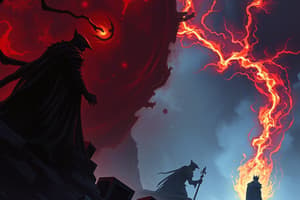Podcast
Questions and Answers
In Act 1, Scene 3, what does Macbeth initially suggest about achieving kingship?
In Act 1, Scene 3, what does Macbeth initially suggest about achieving kingship?
- He needs to seek guidance from the witches to understand his path to the throne.
- He must actively fight to overthrow the current king to fulfill the prophecy.
- He must form alliances with other nobles to challenge Duncan's rule.
- He should patiently wait, as fate will crown him without his intervention. (correct)
How does Macbeth's attitude toward fate evolve by Act 3, Scene 1?
How does Macbeth's attitude toward fate evolve by Act 3, Scene 1?
- He becomes passive, accepting whatever fate has in store for him.
- He tries to reconcile his desires with the prophecies without direct intervention.
- He seeks to understand fate through consulting the witches more frequently.
- He actively challenges fate, attempting to manipulate events to secure his position. (correct)
What is the dramatic irony in Macbeth's belief that he is invincible in Act 5, Scene 8?
What is the dramatic irony in Macbeth's belief that he is invincible in Act 5, Scene 8?
- He misunderstands the witches' prophecy, leading to his downfall. (correct)
- He trusts his soldiers will protect him, despite their growing discontent.
- He believes his past actions have secured his reign, ensuring his safety.
- He is unaware that Malcolm is gathering forces to overthrow him.
What does Macbeth reveal about his ambition in Act 1, Scene 7?
What does Macbeth reveal about his ambition in Act 1, Scene 7?
How does Lady Macbeth's invocation of dark powers in Act 1, Scene 5, reflect her views on free will?
How does Lady Macbeth's invocation of dark powers in Act 1, Scene 5, reflect her views on free will?
What is the significance of the witches' prophecy in Act 1, Scene 3, regarding Macbeth's choices?
What is the significance of the witches' prophecy in Act 1, Scene 3, regarding Macbeth's choices?
How does Macbeth's hallucination and guilt immediately after Duncan's murder in Act 2, Scene 2, affect his state of mind?
How does Macbeth's hallucination and guilt immediately after Duncan's murder in Act 2, Scene 2, affect his state of mind?
What does Lady Macbeth's sleepwalking and attempts to wash the blood from her hands in Act 5, Scene 1, symbolize?
What does Lady Macbeth's sleepwalking and attempts to wash the blood from her hands in Act 5, Scene 1, symbolize?
In Act 3, Scene 2, Macbeth uses the metaphor 'O, full of scorpions is my mind' to describe what?
In Act 3, Scene 2, Macbeth uses the metaphor 'O, full of scorpions is my mind' to describe what?
How does the personification of fate as a warrior in combat in Act 3, Scene 1, reflect Macbeth’s mindset?
How does the personification of fate as a warrior in combat in Act 3, Scene 1, reflect Macbeth’s mindset?
Which of the following best describes the role of guilt in shaping Macbeth's actions and decisions throughout the play?
Which of the following best describes the role of guilt in shaping Macbeth's actions and decisions throughout the play?
How do the witches' prophecies act as a catalyst for Macbeth's downfall, considering his understanding of fate?
How do the witches' prophecies act as a catalyst for Macbeth's downfall, considering his understanding of fate?
What does Lady Macbeth's plea to be 'unsexed' reveal about her understanding of power and control within her society?
What does Lady Macbeth's plea to be 'unsexed' reveal about her understanding of power and control within her society?
In what way does sleep function symbolically throughout the play, particularly in relation to Macbeth's and Lady Macbeth's mental states?
In what way does sleep function symbolically throughout the play, particularly in relation to Macbeth's and Lady Macbeth's mental states?
How does the use of animalistic imagery, such as comparing Macbeth's thoughts to scorpions, contribute to the audience's understanding of his character?
How does the use of animalistic imagery, such as comparing Macbeth's thoughts to scorpions, contribute to the audience's understanding of his character?
Considering both Macbeth's and Lady Macbeth's experiences with guilt, what commentary does the play offer on the psychological effects of ambition and power?
Considering both Macbeth's and Lady Macbeth's experiences with guilt, what commentary does the play offer on the psychological effects of ambition and power?
How might Macbeth's initial hesitation to murder Duncan be interpreted in terms of his struggle between fate and free will?
How might Macbeth's initial hesitation to murder Duncan be interpreted in terms of his struggle between fate and free will?
Which of the following statements best describes the relationship between ambition, fate, and moral corruption in Macbeth?
Which of the following statements best describes the relationship between ambition, fate, and moral corruption in Macbeth?
What is the overarching significance of the prophecies made by the witches, considering Macbeth's tragic trajectory?
What is the overarching significance of the prophecies made by the witches, considering Macbeth's tragic trajectory?
How does the play 'Macbeth' explore the theme of appearance versus reality, particularly concerning the characters' public and private personas?
How does the play 'Macbeth' explore the theme of appearance versus reality, particularly concerning the characters' public and private personas?
Flashcards
Macbeth's Initial Reaction to Fate
Macbeth's Initial Reaction to Fate
Initially, Macbeth believes fate will make him king without his intervention, but his ambition soon drives him to murder.
Macbeth Challenges Fate
Macbeth Challenges Fate
Macbeth challenges fate, ordering Banquo’s murder to alter his destiny, showing his belief in free will.
Macbeth's Overconfidence in Fate
Macbeth's Overconfidence in Fate
Macbeth wrongly trusts fate, believing he's invincible, leading to his death by Macduff.
Macbeth's Sole Motivation
Macbeth's Sole Motivation
Signup and view all the flashcards
Lady Macbeth Invokes Dark Powers
Lady Macbeth Invokes Dark Powers
Signup and view all the flashcards
The Witches' Prophecy
The Witches' Prophecy
Signup and view all the flashcards
Macbeth's Guilt After Murder
Macbeth's Guilt After Murder
Signup and view all the flashcards
Lady Macbeth's Crushing Guilt
Lady Macbeth's Crushing Guilt
Signup and view all the flashcards
Macbeth's Tormented Mind
Macbeth's Tormented Mind
Signup and view all the flashcards
Study Notes
Macbeth’s First Reaction to the Prophecy (Act 1, Scene 3)
- Macbeth initially believes fate will make him king without his intervention.
- "If fate wants me to be king, then fate can make it happen / Without me doing anything."
- Fate is personified, having the power to "crown" Macbeth.
- His ambition soon pushes him to take control of his own destiny through murder.
Macbeth Challenges Fate (Act 3, Scene 1)
- Macbeth actively tries to change fate by ordering Banquo’s murder, showing his belief in free will.
- "If things must be this way, then let fate fight me in a battle / To the very end!"
- Fate is compared to a warrior in combat, using a metaphor.
Macbeth’s Realization About Fate (Act 5, Scene 8)
- Macbeth trusts fate too much and believes he cannot die.
- "I have a protected life, and I cannot be killed / By anyone born from a woman."
- Overconfidence, resulting from misunderstanding the prophecy, leads to his death at Macduff’s hands.
- This is an example of Irony.
Macbeth on His Ambition (Act 1, Scene 7)
- Macbeth admits he has no good reason to kill Duncan, only ambition.
- "I have no motivation to drive me forward, except / My overpowering ambition, which jumps too high / And causes me to fall."
- Ambition is compared to a wild horse that leaps too far and crashes, using a metaphor.
- This foreshadows how his unchecked ambition will lead to his downfall.
Lady Macbeth Invokes Dark Powers (Act 1, Scene 5)
- Lady Macbeth asks spirits to remove her womanhood and fill her with cruelty to carry out Duncan’s murder.
- "Come, spirits that influence deadly thoughts, remove my womanhood, / And fill me from head to toe / With the worst cruelty possible!"
- Imagery is used to describe Lady Macbeth being filled with evil.
- This highlights her embrace of free will over morality.
The Witches’ Prophecy (Act 1, Scene 3)
- The witches plant the idea of kingship in Macbeth’s mind.
- "Greetings, Macbeth! Hail to you, Thane of Glamis! / Greetings, Macbeth! Hail to you, Thane of Cawdor! / Greetings, Macbeth! You will be king in the future!"
- Macbeth questions whether fate alone will make him king or if he should act to fulfill the prophecy himself.
- This is an example of dramatic irony.
Macbeth’s Guilt After Murder (Act 2, Scene 2)
- Macbeth is immediately haunted by guilt after killing Duncan.
- "I thought I heard a voice cry, ‘You will never sleep again! / Macbeth has murdered sleep—sleep, which is innocent and pure.’"
- Sleep is personified as an innocent victim that Macbeth has "murdered."
- Macbeth is not at peace with his actions, despite choosing to follow ambition.
Lady Macbeth’s Guilt (Act 5, Scene 1)
- Lady Macbeth now feels the weight of her crimes and realizes that guilt cannot be washed away.
- "What? Will my hands never be clean of this blood?"
- Her hands symbolize guilt, and the blood represents the murder of Duncan, which is symbolism.
- This marks her downfall, showing that free will comes with consequences.
Macbeth’s Torment (Act 3, Scene 2)
- Macbeth’s paranoia consumes him, and he is willing to kill anyone in his way.
- "Oh, my mind is full of scorpions, dear wife!"
- Macbeth’s thoughts are compared to scorpions, showing how poisonous and dangerous they have become, which is a metaphor.
- Ambition has turned into a toxic obsession.
Studying That Suits You
Use AI to generate personalized quizzes and flashcards to suit your learning preferences.




